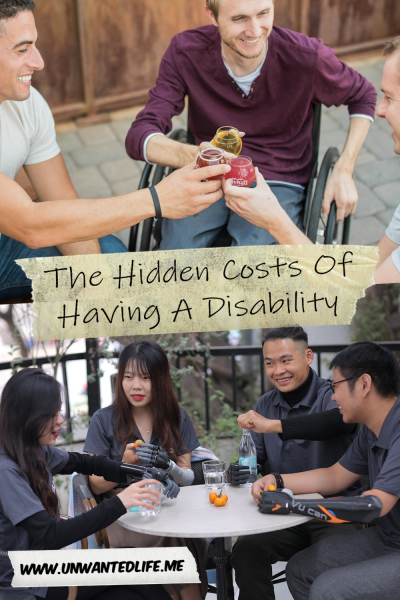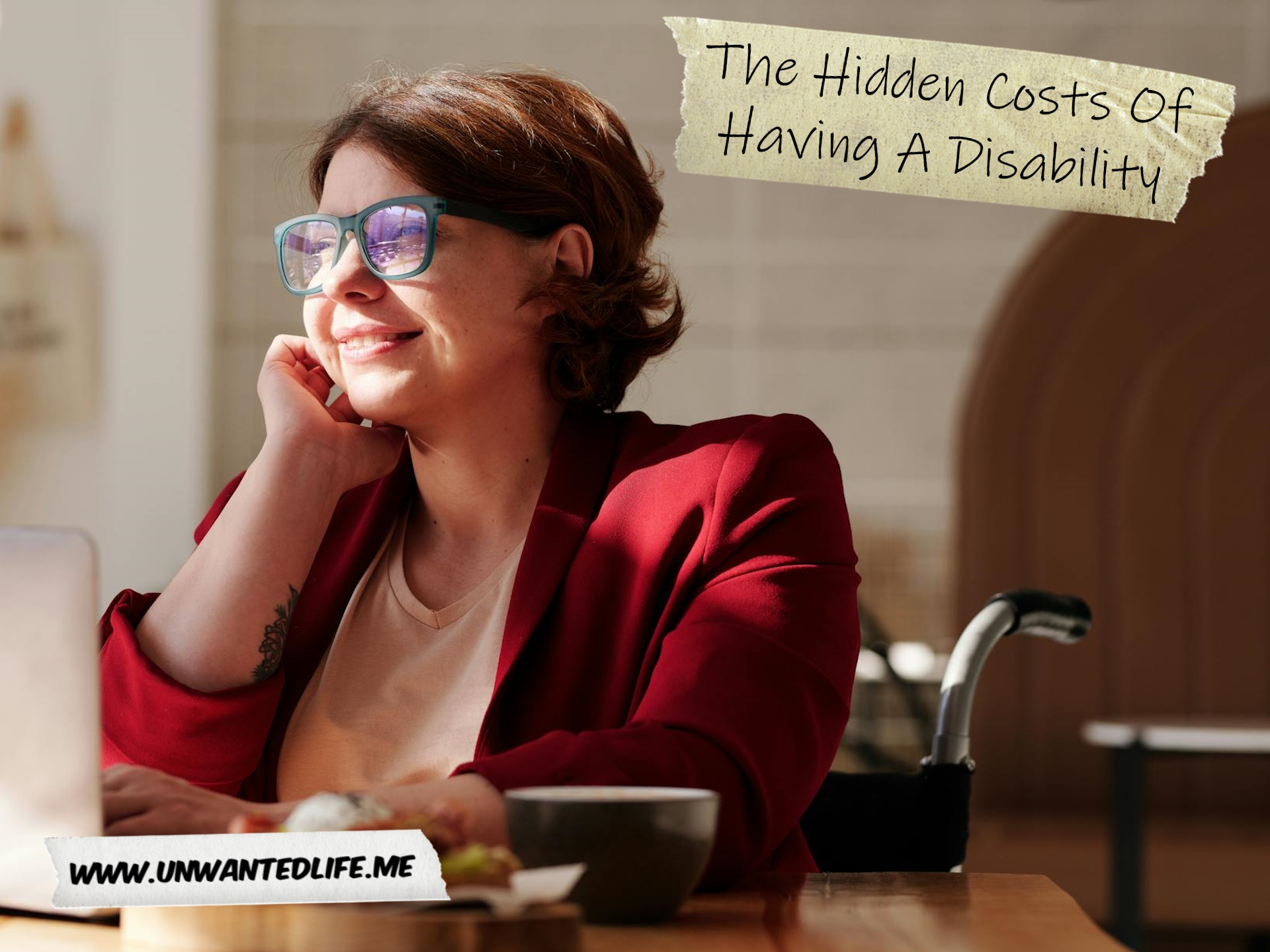When we think about disabilities, we often focus on the visible challenges people face. But there’s a lot more beneath the surface that most people don’t see. The hidden costs of having a disability can add up quickly, affecting not just our finances but also our mental and emotional wellbeing. So in this article, let’s take a closer look at these hidden costs and how they affect people’s lives.
Disclaimer: This is a sponsored article, but all thoughts and opinions are my own.
Hidden Costs: Financial Strain
One of the most significant hidden costs of having a disability is the financial strain. Medical equipment like wheelchairs, hearing aids, or a rollator can be really expensive (my mum had to get a rollator after her cancer destroyed the bones in her back). And that’s not even counting the cost of maintenance and repairs. Insurance, state benefits, and grants might cover some of these expenses, but often not all of them, leaving many people to pay out of pocket.
Beyond medical equipment, there are also extra healthcare costs. Regular visits to specialists, therapy sessions, and medications can quickly drain a bank account, especially in America. And if someone needs home modifications, like adding ramps or accessible bathrooms, that’s another hefty expense to think about. It’s a lot to manage, and it can be overwhelming if you’re not financially prepared.
According to the National Disability Institute and Morris, McGarity, Goodman, and Zaidi (2022), a household with an adult who has a work-disability will require 28% more income ($17,690) on average, to achieve the same standard of living as a household without a disability. Morris, McGarity, Goodman, and Zaidi (2022) also worked out that the poverty level of households that include adults with disabilities is 35%.
In the UK, Scope reports that households with at least one disabled adult or child incur extra costs of £975 per month. Turn2us also comments on Scope’s report, telling us that this monthly figure works out to £6,840 a year, with one in four disabled people paying over £12,000 (depending on their condition).
Fortunately, in England, Wales, and Northern Ireland, you can apply for a Disabled Facilities Grants (Disability Rights UK), whereby your local authority will fund adaptations to your home or can provide you with aids if it’s to assist with nursing at home or aid daily living. A similar grant also exists in Scotland.
Hidden Costs: Employment Challenges
Finding and keeping a job can be tough when you have a disability, with 46.5% of disabled people in the UK being unemployed, according to the Office for National Statistics. It can also be difficult to know if you should declare your disability if it’s an invisible disability, for fear of it affecting your job prospects.
Unfortunately, some employers might be hesitant to hire someone with a disability, even though it’s illegal to discriminate. Depending on where you live, some employers might not provide the accommodations needed for a person with a disability to do their job effectively. This can limit job opportunities and make it harder to earn a steady income.
However, in the UK, your employer is legally required to make all reasonable adjustments to help people work who have a disability. If you still need support after your employer has taken all legally required action, then you can also apply for the Access to Work grant. This can be used to help pay for practical support, support for managing mental health, and to pay for communication support in interviews.
Moreover, people with disabilities often have to take more time off for medical appointments or because of health issues, which can affect their job performance and chances of promotions. In some cases, they might even have to work part-time instead of full-time, reducing their income even more. It’s a cycle that’s hard to break out of and adds to the stress.
Thankfully, there are many more jobs these days that allow someone to work from home. This can be a great help for people with disabilities, especially if it’s mobility-related. Since they don’t need to commute to work, they can just work in the comfort and safety of their own home, and their employer may even help fund different modifications to make working from home more efficient.
But let’s say, you can find a job but you’re not able to work from home, but your employer takes all reasonable measures to assist you in being able to work on-site. What other barriers might there be regarding employment? Emens (2020) pointed out that public transport is often a barrier to disabled people with getting from A to B, and in this case, B would be their place of work.
Depending on a person’s disability, they may not be able to access trains or the underground network because not every station has elevators or step-free access. This makes transport another hidden cost for those with a disability.
Hidden Costs: Social And Emotional Costs
Living with a disability can also take a toll on social and emotional wellbeing. It can be isolating, as some people might feel uncomfortable or unsure of how to interact with someone who has a disability. This can lead to fewer social interactions and friendships, making it hard to build a strong social support network.
Dating with disabilities also presents its own set of challenges. People with disabilities might feel self-conscious or worry about being judged by potential partners. They might also face physical barriers that make dating activities difficult. This can make finding and maintaining romantic relationships more complicated and stressful.

Hidden Costs: Mental Health Impact
All these hidden costs can weigh heavily on mental health. Constantly worrying about your finances, job security, and social interactions can lead to anxiety and depression. The stress of managing a disability on top of everyday life challenges can be exhausting and overwhelming, and most people would crack under the pressure.
It’s essential to have access to mental health support to overcome this, but even that can be an added expense. Therapy sessions, counselling, and medication for mental health issues can further strain finances, creating a vicious cycle. Without proper support, it’s easy to feel defeated and alone.
Coping Strategies And Support
Despite these hidden costs, there are ways to cope and find support to make things easier. Connecting with others who have similar experiences can be incredibly helpful. Support groups, both in-person and online, offer a space to share struggles and find advice from those who understand and can make someone with a disability feel more included and understood.
Advocating for better policies and accommodations in workplaces, schools, and public spaces can also make a huge difference, not just for you, but for everyone else with a disability. By raising awareness and pushing for change, we can help reduce some of the hidden costs associated with disabilities. It’s about creating a more inclusive and supportive environment for everyone.
It’s also important to research what grants and other funding might be available to support you with your health issue or disability. As I’ve mentioned in this article, in the UK you have schemes like Access to Work grant and Disabled Facilities Grants. So if you live in the UK, look into these grants, and if you live elsewhere in the world, find out what your country offers, because these kinds of grants and support can often fly under the radar.
Summary
The hidden costs of having a disability extend far beyond what most people see. From financial burdens to social and emotional challenges, these costs can significantly impact one’s quality of life. By understanding and addressing these hidden costs, we can work towards a more inclusive society where everyone has the support they need.
As always, leave your feedback in the comments section below. Also, please share your experiences with the hidden costs of having a disability or invisible health and mental health condition in the comments section below as well. Don’t forget, if you want to stay up-to-date with my blog, you can sign up for my newsletter below. Alternatively, click the red bell icon in the bottom right corner to get push notifications for new articles.
Lastly, if you’d like to support my blog, then there are PayPal and Ko-fi donation payment options below. Until next time, Unwanted Life readers.
References
Emens, E. F. (2020). Disability admin: The invisible costs of being disabled. Minnesota Law Review, 105, 2329. Retrieved from https://scholarship.law.columbia.edu/cgi/viewcontent.cgi?article=3944&context=faculty_scholarship, https://libpubsdss.lib.umn.edu/minnesotalawreviewprod/wp-content/uploads/2021/05/4-Emens_MLR-w-ALT-Text.pdf, and https://minnesotalawreview.org/wp-content/uploads/2021/05/4-Emens_MLR-w-ALT-Text.pdf.
Morris, Z. A., McGarity, S. V., Goodman, N., & Zaidi, A. (2022). The extra costs associated with living with a disability in the United States. Journal of Disability Policy Studies, 33(3), 158-167. Retrieved from https://www.nationaldisabilityinstitute.org/wp-content/uploads/2020/10/extra-costs-working-paper.pdf.
Support
Disabled Facilities Grants
Access to Work


There are a lot of hidden costs to being disabled. People sometimes assume that a large amount of help and funds are given to disabled people. That is not true, especially in America.
America does seem to lag behind Western counties in areas like this. Thanks for commenting